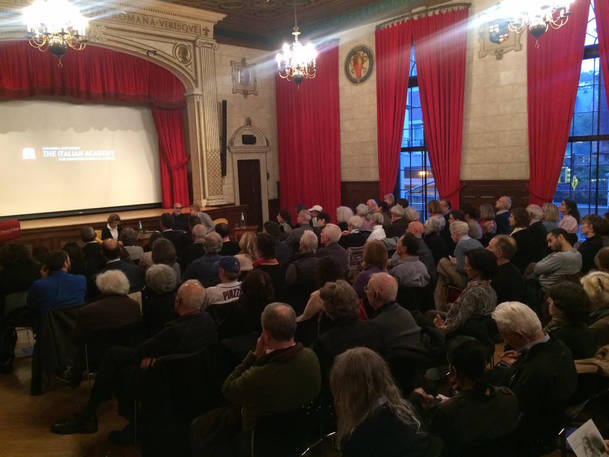


Primo Levi [2] is considered one of the most talented Italian authors of all time with his most notable work being “Se questo è un uomo [3]” which recounts his experience as a Holocaust survivor. The memoir describes his initial arrest for being part of the anti-fascist resistance group during World War II as well as the experience that followed living in the Auschwitz concentration camp. In this masterpiece, Levi managed to beautifully express humanity during a time of complete inhumanity and barbarism.
This week, two of the editors that worked on "The Complete Works of Primo Levi [4]" came to the Italian Academy [5] to have a conversation about Levi’s writing and his astonishing versatility. Ann Goldstein [6] is an editor at The New Yorker [7] as well as a translator for many notable Italian authors including Elena Ferrante [8]. Marco Belpoliti [9] is a professor at the University of Bergamo [10] and also works as a contributor to several newspapers and magazines.
The established editors praised Levi not only for being such a prolific writer but for producing so much great work in so many different styles. Belpoliti described his words as precise, humane, intellectual, as well as philosophical. He managed to combine political, scientific, and linguistic aspects into his literature which is not an easy task.
This allowed his audience to grow and include more people who can appreciate his work. Levi has published not only memoirs but novels, short stories, poems, essays, and commentary all throughout his lifetime as well. Goldstein said that “he was not recognized in all of his many guises until recently but to see all his different writing together, to see him as the witness, as the science fiction writer, as the autobiographical writer, to see all these things together shows the complexity of Levi as a writer.” Belpoliti put it best when he said that Levi is a “360 degrees writer.”
Levi was known, especially in the United States, mostly as a witness, as a Holocaust survivor which is something he didn’t want. “The Complete Works” enables people to see the parts of Levi that are not well known. These special components include all the sci-fi short stories, essays on current events, and even a story he wrote that was made completely out of palindromes. It is clear that he was a gifted writer and Goldstein adds that what “underlines all of his work is the dedication to the importance of language.” He strived for lucidity and precision in his writing, a quality that he attributed to his training and practice as a chemist. The goal is to be clear, to the point, and understandable by everyone but at the same time, there is nothing cold or detached in this clarity. According to Goldstein, “Levi has the tone of a scientific observer but he is never pedantic or condescending, he often manages to include humor in his words.”
Even though Levi passed away in 1987, his essence and his legacy lives on through his writing. "The Complete Works of Primo Levi" is on sale for those who are interested in learning more and getting into the mind of this great intellectual.
Source URL: http://test.casaitaliananyu.org/magazine/focus/art-culture/article/fresh-view-primo-levi
Links
[1] http://test.casaitaliananyu.org/files/italianaccolumbialevijpg
[2] https://en.wikipedia.org/wiki/Primo_Levi
[3] https://en.wikipedia.org/wiki/If_This_Is_a_Man
[4] https://www.amazon.com/Complete-Works-Primo-Levi/dp/0871404567
[5] http://italianacademy.columbia.edu/
[6] https://en.wikipedia.org/wiki/Ann_Goldstein_(translator)
[7] http://www.newyorker.com/
[8] https://en.wikipedia.org/wiki/Elena_Ferrante
[9] https://it.wikipedia.org/wiki/Marco_Belpoliti
[10] https://en.wikipedia.org/wiki/University_of_Bergamo